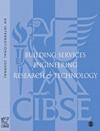模块化个性化气候测试基础设施,具有基于智能手机的用户反馈
IF 1.8
4区 工程技术
Q3 CONSTRUCTION & BUILDING TECHNOLOGY
Building Services Engineering Research & Technology
Pub Date : 2022-10-17
DOI:10.1177/01436244221132688
引用次数: 0
摘要
建筑物和车辆的供暖和通风占全球最终能源使用量和由此产生的排放量的三分之一以上。当地气候有助于节约能源,同时使人们周围的微气候更加个性化和适应。对于局部舒适性领域,传感器、执行器和控制软件的集成测试环境很少,而且往往是针对特定的一组组件量身定制的。在此,提出了一种基于服务器的模块化测试基础设施,该基础设施允许对传感器、执行器和控制策略进行集成和评估。目前,该系统能够集成、监测和记录热成像、运动传感、环境传感器(如温度或空气速度)的数据,并将信号转发给风扇、红外或接触式加热器等致动器。控制信号的生成是基于模型的,并依赖于通过系统的智能手机应用程序提供的用户反馈。最后,学习算法可以在用户研究期间进行训练和比较。实际应用:尽管是在实验室研究环境中开发的,但所提出的系统是基于开放标准和协议的。因此,从业者、开发人员和制造商可以应用它,以测试独立组件以及传感器和致动器的组合,从而以集成和可复制的方式实现个性化气候。本文章由计算机程序翻译,如有差异,请以英文原文为准。
Modular personalized climatization testing infrastructure with smartphone-based user feedback
Heating and ventilation in buildings and vehicles are responsible for over a third of global final energy usage and the resulting emissions. Local climatization can help to save energy while at the same time enable more individualized and adapted micro-climates around people. For the domain of local comfort, integrative test environments for sensors, actuators, and control software are scarce, and oftentimes tailored to a specific set of components. Here, a server-based modular testing infrastructure which allows integration and evaluation of sensors, actuators, and control strategies is presented. Currently, the system is able to integrate, monitor, and log data of thermal imaging, motion sensing, environmental sensor such as temperature or air velocity and to forward signals to actuators such as fans, infrared- or contact-heaters. The generation of control signals is model-based and relies on user feedback provided via the system’s smartphone app. Lastly, learning algorithms can be trained and compared during user studies. Practical Application: Although developed in a laboratory based research context, the proposed system is based on open standards and protocols. It therefore can be applied by practitioners, developers, and manufacturers in order to test stand-alone components as well as ensembles of sensors and actuators for personalized climatization in an integrative and replicable manner.
求助全文
通过发布文献求助,成功后即可免费获取论文全文。
去求助
来源期刊

Building Services Engineering Research & Technology
工程技术-结构与建筑技术
CiteScore
4.30
自引率
5.90%
发文量
38
审稿时长
>12 weeks
期刊介绍:
Building Services Engineering Research & Technology is one of the foremost, international peer reviewed journals that publishes the highest quality original research relevant to today’s Built Environment. Published in conjunction with CIBSE, this impressive journal reports on the latest research providing you with an invaluable guide to recent developments in the field.
 求助内容:
求助内容: 应助结果提醒方式:
应助结果提醒方式:


